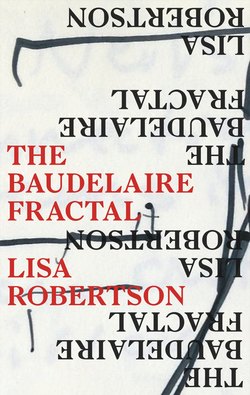The Baudelaire Fractal

Реклама. ООО «ЛитРес», ИНН: 7719571260.
Оглавление
Lisa Robertson. The Baudelaire Fractal
THE. BAUDELAIRE. FRACTAL
Отрывок из книги
LISA ROBERTSON
COACH HOUSE BOOKS, TORONTO
.....
The two imaginary seaports by Claude, these complex frontiers of an urban ambiance, as Guy Debord described them, were rivalled in their beauty, he said, by the Paris metro maps conveniently posted at stations. The affinity of the maps and Claude’s seaports had to do, he claimed, with his characteristically utopian vagueness, with ‘a sum of possibilities’ rather than any compositional aesthetics. It’s a literary mode of comparison, using not signs as its components, but the transformative potency of transitions. Metaphors, in other words. His method also takes into account the anticipation of transitions, not only the events themselves, which is what I like about metaphor, and about Debord: time is perversely multiplied. Nothing replaces anything else; contradictory sensations acquire contingent truth. The baroque seaports of Claude Lorrain exist right now as future potentials. I would agree with Debord about the psychogeographic equivalence of the harbour’s beauty with the modern transports, but with the proviso that the similarity holds only for the time before one has ever visited Paris, when the metro and its map is still a pittoresque novella by Queneau borrowed from a smalltown library, or glimpsed in a scene in a film by Godard, the one for example where Anna Karina, her childish face and pulled-back hair being lightly stroked all the while by her lover, looks at the presumed sadness of the other metro passengers – the moody boy with the cake box, the bored businessman reading the newspaper – and recites, then sings aloud, a poem by Aragon: Things are what they are. From time to time the earth trembles. The train pulls up to a station called Liberté. But is there a station called Liberty? I have never noticed it on any line I’ve travelled. And were the men sad? Maybe they were just angry. The tautly inflected instant of transformation between vocal recital and song, the poignant artifice of the threshold marked by a slight catch in her voice, a kind of physiological caesura or inflation that also seems spiritual, is what I recall most intensely of this film, first seen on a small static-strewn television screen in one of the shared sprawling apartments of the eighties, those roughly furnished places now mythic for their three-day parties and cut-up poems strewn across patterned blue carpets, also faded. Those carpets had soul – the pile rubbed bare to the rough jute warp in places of passage, the arabesque, as Poe called it, not only traced out in gridded botanical curlicues by the yarn of the pile, but stamped directly onto the now-visible jute backing with a kind of indelible blue-black ink. True, Poe preferred crimson carpets.
Transposed maps of different regions would be a variant explanation. The Vancouver hotel room I occupied that morning seemed in my state of half-wakefulness to contain all the hotel rooms and temporary rooms I had ever stayed in, not in a simultaneous continuum, nor in chronological sequence, but in flickering, overlapping, and partial surges, much in the way that a dream will dissolve into a new dream yet retain some colour or fragment of the previous dream, which across the pulsing transition both remains the same and plays a new role in an altered story, like a psychic rhyme, or a printed fabric whose complex pattern is built up across successive layers of impression, each autonomously perceptible but also leading the perceiver to cognitively connect the component parts in an inner act of fictive embellishment, so strong is the desire to recognize a narrative among scattered fragments of perception. My own youth seems to move in my present life in such a way – present and absent, at times incoherent, sometimes frightening, scarcely recognizable, rhyming and drifting.
.....